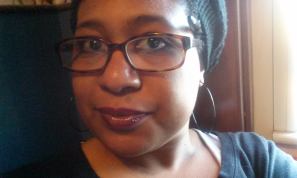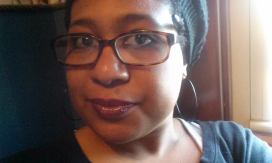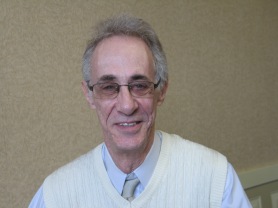
By Shermeeka Mason
Before I started practicing Nichiren Buddhism, I considered myself a Spiritualist.
While living in Buffalo, New York I was a member of the only Spiritualist churches in the East Aurora area. Almost every Sunday, I sat in my usual spot in the second pew and listened to sermons about cause and effect, the Law of Attraction, and how thoughts were things that greatly influenced our existence—as well as our connection to the spirit realm.
The latter message was one that was preached to us often: that our thoughts—both positive and negative—determine our quality of life. That when we think negatively, the universe will respond accordingly and we as human beings are ultimately responsible for the outcome. That was why positive thinking and focusing on abundance was paramount to truly moving our lives forward.
I recognize now that these sermons were about the power of cause and effect, but I didn’t realize that the Spiritualist definition was completely dissimilar to the one that resonates with me today. Yet back then, I usually walked away from the service harboring a deep-seated indignity and discouragement. Unbeknownst to the members, I was diagnosed with severe depression, anxiety, Post-Traumatic Stress Disorder, and (eventually) Inattentive Attention Deficit Disorder so I continuously struggled with negative thinking associated with emotion irregularities. Even before becoming a Spiritualist, I practiced various religions while adopting portions of ideologies in order to combat symptoms unaddressed and therefore untreated.
So whenever I went to the lunch hour after the Spiritualist service, I observed fellow members and silently wondered if I were disappointing Spirit for my inability to “think abundance.” I soon reached out to one of the leaders to gain clarity—excluding all information regarding my mental illness. Her response was that my thoughts were as potent as speech and that any negative thinking would block my blessings, connection with Spirit, and greatly affect my relationships with other people.
I tried desperately to shift my thinking with meditation to prevent this from happening, but silence only invited more negative messages about me and my life condition (if I even have the wherewithal to maintain focus). This alone confirmed the internalized belief that I was never meant to achieve happiness and serenity.
So when I was introduced to Nichiren Buddhism by a class presentation in one of my grad school courses, I pretty much divorced myself from any aspect of hope. Yet the information presented, Michelle Joo’s experience on Buddha in America and the genuine kindness of Gail, a Buffalo member piqued my interest. Though believing that happiness escaped me and feeling as if Spirit had completely left me, I found that I still possessed a sliver of hope within me. Maybe this is what I need, I thought.
I attended my first SGI Youth discussion meeting with an understandable amount of anxiety and distrust. I was weary of the smiling faces owned by these complete strangers sitting at a table, automatically assuming that they will dislike me after intuiting my mental illness. But the moment I sat in an empty chair, they immediately asked questions about me and why I was interested in the practice. The discomfort I experienced slowly deteriorated as I began telling them my story, asking questions, and finally disclosing my struggles with mental illness.
Emi, the North Zone Youth Division Leader, responded with how proud she was of me, how glad she was to meet me before sharing her experience with depression associated with her mother’s suicide. Instead of internalizing her pain, she utilized it to strengthen her practice and the mentor/disciple relationship with her mentor, SGI President Daisaku Ikeda. Soon after, other members began to share honestly about their struggles and how chanting nam-moyho-renge-kyo ignited their inner wisdom to courageously face even the most desolate obstacles to take action on their own accord.
I’d NEVER heard of an ideology like this. The religions I practiced over the years always taught me that I had to relinquish my personal and spiritual power over to a Higher Being. Meaning that only Spirit can bless me with the existence I so desperately longed for. These Nichiren Buddhist, however, were completely discrediting that particular ideology by stating that I have the capability to obtain the life I’ve always wanted—I just have to chant consistently, have faith in myself, and study with other members.
I left the discussion feeling validated and accepted for who I was at that moment—something I have never experienced at the Spiritualist church. So I decided to try Nichiren Buddhism just to determine the validity of the practice, considering that I had nothing to lose other than the shred of sanity I managed to cling onto. So I began chanting, becoming involved in youth activities, and actually started to see benefits. I even received my gohonzon in the summer of 2013.
Despite all of this, my negative thinking became increasingly persistent. Though logically aware that the members displayed no evidence of wanting to harm me, I still had suspected that it would only be a matter of time before they did. On top of dealing with a rising bout of anxiety induced paranoia, there was still the notion of expressing continuous joy in order to become a true Buddha. And because of my mental illness, I was unable to do so. Thus, I attended meetings thinking that everyone had the capability to be happy but me.
A suicide attempt and unforeseen life circumstances forced me to realize that none of that was accurate. In fact, chanting nam-myoho-renge-kyo actually revealed to me why my mental illness was so profound over the years. Besides being either undermedicated or not at all, I very rarely did I address my issues properly because I feared the personal accountability/responsibility needed to work towards being whole—despite undergoing years of therapy. I instead heavily relied on people, places, situations, and Spirit to rescue me from my problems.
More importantly, though, I also acknowledged the bulk of my issues stemmed from unresolved childhood trauma and resented the fact that I was cleaning up a mess that I myself didn’t make. But this practice taught me the power of cause and effect, that as an adult I’ve the ability to transform my life so I am no longer controlled by my past. This fact required me to practice self-care that involved seeking professional help for my mental illness and neurodivergence.
Today, I am seeing an amazing therapist and psychiatrist—in addition to taking medication to manage my symptoms. I am able to concentrate, so I am able to chant consistently for an hour, meet with other members, and retain the information in the publication. In the past, my depression and anxiety was so severe that I didn’t even chant—let alone leave the house. But my fellow Buddhists were patient with me because some of them know of my struggles with mental illness and neurodivergence. They didn’t encourage me to smile, “think abundance,” or get over it. I was often told to come to the gohonzon as I am, so that was what I did and continue to do.
With the combination for my practice and receiving professional help, I am pretty much transformed me into the woman I’ve always wanted to be: beautiful, confident, strong, intelligent, creative, and a true bodhisattva of this Earth.
.

